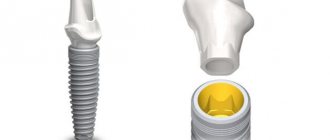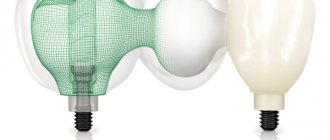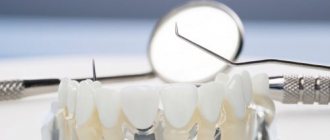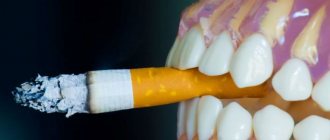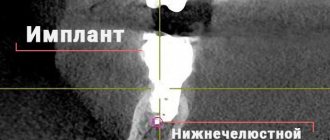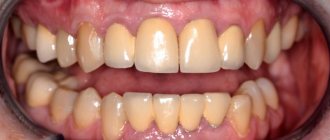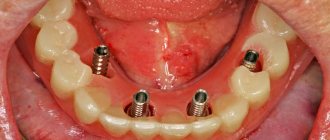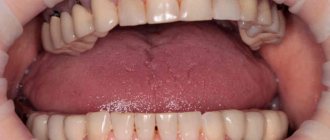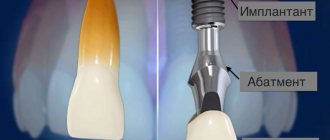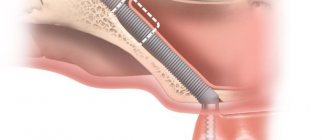The success of dental implantation consists of two main components - high-quality materials and the professional work of the doctor. In most cases, both of these factors go hand in hand, because if dentistry cares about improving the qualifications of its specialists, then it chooses implant manufacturers with the utmost care. Today, Nobel Biocare is considered one of the most popular brands in the industry. Nobel Biocare dental implants have been used all over the world for over 40 years and have a well-deserved reputation as the most reliable and safe. Let's look at why they are good and why they are used by the best world-famous clinics, together with the implant surgeon at Ilatan Dentistry in Moscow Berdzenadze Zurab Zaurievich.
Nobel Biocare implants: expert opinion
Implantation is one of the most popular procedures in dentistry today.
At the same time, there are a large number of implants on the market, which raise many questions among patients and create a serious choice problem. Dental surgeon and clinic physician Dr. Plombir El-Lulu Marouane Fahti tells us what Nobel Biocare and Anthogyr implants are and what their features are.
Question: What causes the presence of different types of implants in dentistry?
Answer: In my opinion, there are not many significant fundamental differences in different implantation systems. In the modern dental market there are a sufficient number of positively proven manufacturers. The production of implants is a delicate and labor-intensive process, which determines both the comfort and service life of prostheses supported by these implants. In my practice, I have used several implant systems. Each of these systems had both advantages and disadvantages. In a modern dental clinic, in my opinion, several implantation systems should be used for an individual approach to each specific case.
Question: Are there significant differences between different types of implants?
Answer: Any implant system does not have any serious fundamental differences from other systems, mainly the difference is in the price category.
Nobel Biocare dental implants are used for almost all types of implant surgeries.
The implants themselves are divided into 2 types: cylindrical and root-shaped. In total, 6 types of implants are produced, all of them have a screw-in method of implantation - the thread of the implant is smoothed closer to its end.
Nobel implants are created mainly for patients suffering from bone deficiency. Root-like structures are suitable for implantation using the classic two-stage method, as well as using the instant method, immediately after tooth extraction. They are still actively used today: implants are perfectly installed, created from the purest titanium and are extremely rarely rejected.
Titanium implants Antozhir are sandblasted with tiny particles of two-phase calcium phosphate. The rough surface reliably stabilizes the implant, its strong connection with the bone, ensures rapid healing and long service life. In terms of cost, implants of this brand belong to the middle price category.
Question: What are the real advantages of Nobel Biocare and Anthogyr over other systems?
Answer: Advantages of Nobel Biocare implants:
1. The surface layer of “TiUnite” ensures engraftment up to 100%: the coating is similar in structure to human bone.
2. Possibility of implantation without bone growth : bone grows around the implant after its installation.
3. Special shape of implants : for quick, painless penetration of the structure into the tissue.
4. Accelerated healing: there are no postoperative sutures, the blood supply to soft tissues is not disrupted.
5. Aesthetic design: implants are suitable for implantation of anterior teeth, and are also used in complex clinical cases.
Advantages of Anthogyr implants:
1. Special implant neck: prevents the formation of pathological pockets along the structure, ensures extreme stability of the implants and creates the effect of a natural tooth.
2. Purity of the material: implants undergo several stages of cleaning and sterilization.
3. BSP treatment of the implant using phospho-calcium apatite: an exceptionally clean surface is created, the biocompatibility of the material is increased and 100% engraftment of the implant is achieved.
Question: How secure are these systems?
Answer: The system complies with all international standards of control and quality. Many years of practical experience show that these systems are safe.
Question: Are there any contraindications for Nobel Biocare and Anthogyr implantation?
Answer: Contraindications to dental implantation include:
- diseases of the blood and hematopoietic organs. For example, a bleeding disorder.
- malignant neoplasms of various organs and systems (cancer, sarcoma).
— immunopathological conditions (surgical interventions necessarily require some time of active and rather intense work of the immune system for normal tissue healing after surgery)
- systemic connective tissue diseases.
- tuberculosis and its complications
— general surgical grounds for refusing any intervention.
— contraindications to anesthesia (for example, intolerance to anesthesia).
- endocarditis and other heart diseases, rheumatic diseases, etc.
- exhaustion of the body (cachexia)
— unsatisfactory oral hygiene (this item is a direct indication for the appointment of removable prosthetics).
There are many contraindications for dental implantation, but only some are those that make treatment impossible. By the way, age is not an absolute contraindication. In most cases, preliminary preparation and treatment of the patient can successfully get rid of many contraindications or reduce their impact.
Question: How is implantation performed using Nobel Biocare and Anthogyr?
Answer:
— Planning of prosthetics.
Since crowns, bridges or dentures will later be installed on the implants, it is important to have a prosthetic plan in advance. Often the location of existing teeth determines the position of the implants. Thus, before implantation, a plaster model is usually made, on which the dentist determines the subsequent position of the implants in the jaw.
- Preparation.
You should not plan important activities or meetings for several hours after implantation. In the hours following the procedure, you should rest quietly.
Nobel history
Nobel Biocare implants are perhaps the most famous in the world.
They have been occupying the premium segment of the market for over 50 years, their history is directly related to the founder of the dental implant, Per-Ingvar Brannemark. Nobel's consistently high quality and ongoing research and development help clinicians achieve superior appearance and functionality even in the most challenging clinical situations. Nobel implants are not cheap, but they can be installed at the Vimontale clinic on a special offer. Nobel was founded by Per-Ingvar Brannemark, a scientist who discovered the phenomenon of osseointegration, that is, the fusion of titanium plates with human bone, in the mid-twentieth century. In 1965, Brannemark installed dental implants on a young man who was injured in a car accident. The implants served him for more than 40 years, until his death. Since then, the company has not stopped its scientific research and regularly introduces innovations that become the flagships of the implantology industry. Thus, it was Nobel Biocare that was responsible for the invention of conical implants, which today have completely replaced other forms because they are ineffective. He also began using custom CAD/CAM drawings and introduced 3D diagnostics and treatment planning based on surgical templates.
What are the most expensive dental implants?
Implantation using a metal pin is an excellent replacement for standard prosthetics with crowns and bridges. With high-quality installation, discomfort and unpleasant sensations quickly disappear, leaving the result with a perfect smile. Dentists often recommend the most expensive implants, which raises many questions for the client. The offer is not always associated with the desire to receive additional profit. These dentures are of the highest quality and often have a lifetime warranty.
Advantages of expensive implants
An implant or implant is a metal base-rod that replaces a destroyed root. An abutment and a crown imitating a tooth are attached to it. The technique appeared relatively recently, but is already enjoying well-deserved popularity. Thanks to her, many people solved the problem of losing chewing and front molars and forgot about the discomfort when wearing dentures. All clients cite the high cost of the service as the only drawback.
A good pin has a unique structure and a considerable price. A small piece of metal alloy is inserted into the bone under local anesthesia. In a few weeks, it takes root and grows into the jaw, accepted by the body as its own tooth root. To eliminate problems and complications at this stage, dentists recommend the most modern implants. They differ from budget ones not only in cost, but also in a number of advantages:
- The latest models are made only from bioinert alloys based on zirconium, titanium and tantalum. They do not oxidize or enter into chemical reactions with blood cells, so the risk of rejection is no more than 0.5–1%.
- The surface of the pin in an expensive prosthesis has a special cross-section that easily fits into the bone and does not damage it. After installation surgery, patients rarely complain of swelling, pain and itching go away much faster.
- High-quality implants have a rough and porous surface, so they fuse faster with bone and soft tissue and rarely provoke an allergic reaction.
- Many companies produce microprostheses adapted to a specific problem (correcting a bite, securing a bridge). They have a complex structure, and therefore are characterized by increased cost.
- The most expensive implants come with a lifetime warranty.
- Modern types of pins are installed in just a one-time visit to the dentist in one stage, significantly reducing the client’s time for healing the mucous membrane and adapting the entire body.
In budget options, metal alloys and various additives that can cause rejection are still actively used. In this case, the patient has to undergo this expensive procedure again and spend money on buying a new pin.
Indications and contraindications for the installation of Nobel Biocare implants
Indications
The solutions offered by Nobel Biocare allow you to cope with all existing problems with missing teeth:
- With a single edentia. In the absence of a seeding apparatus, the NobelActive, Nobelreplace and NobelSpeedy systems are used, which are suitable for both classical two-stage and one-stage progressive implantation. The manufacturer offers many design options, so you can choose the best option for any clinical case.
- Completely edentulous. Nobel offers a patented All-on-4 implant technique in which there are no teeth in a row. The uniqueness of the method is that tooth restoration is possible in one day: implantation and prosthetics occur immediately. The proposed All-on-4 system is also indicated for patients with bone failure.
- In case of severe bone atrophy, our clinic specialists will offer you a zygomatic implant with Zygoma extended zygomatic implants (30-52 mm). This method is applicable in a complex of “All-on-4” and “All-on-6” protocols, which is cheaper than other types of prostheses.
Contraindications
The list of contraindications is small. The use of Nobel implants is not recommended in the following cases:
- allergy to titanium (extremely rare);
- during pregnancy, breastfeeding;
- some common diseases of the body.
Any temporary or absolute contraindications are identified during the first visit to the dentist when collecting a clinical picture. An accurate answer about contraindications can sometimes be obtained not during the examination, but after receiving the diagnostic results.
Types of modern dental implants
Before implantation, the dentist carefully examines the areas where he plans to install the metal rod. If they are too thin or deformed, the risk of fracture is increased; the orthodontist suggests installing expensive implants. Depending on the situation, one of the following systems is recommended:
- Root-shaped : outwardly looks like a long screw, has a similar thread and a small cap for fixing the abutment. This is a universal option, suitable for situations without complications and pathologies.
- Lamellar : attached to and support thinned bone tissue, they differ in length by 0.8–1.2 centimeters.
- Combined : used to eliminate jaw deformation or in severe cases, they combine 2 methods of fastening in the mouth.
- Subperiosteal : new generation implants with complex structure. They are so light and thin that they allow prosthetics to be performed on particularly fragile parts of the jaw without prior surgery to build up bone tissue.
Features of Swiss implants
The features of European-made implants have become the main reason for the popularity of new prosthetic technology. Among the characteristic properties of the products are:
- The ability to install implants with a minimum amount of dental bone tissue. The fixation features of the titanium prosthesis make it possible to install the system in the gum without prior bone growth.
- Form. The titanium implant is made in the shape of a cone. The anatomical shape of the product guarantees its easy penetration into the gums, without causing additional mechanical damage to the gums. The top of the implant has a triangular shape, which allows the crown of the prosthesis to be fixed in the gum as firmly as possible. Only if the titanium root has a conical shape, the dentist has the opportunity to install a prosthesis on the day of extraction of the diseased tooth. Otherwise, the dentist is forced to wait for the muscle tissue to heal in order to eliminate the risk of developing an inflammatory process.
- Surface. This is a unique development of the Swedish company. The materials from which the surface layer of the prosthesis is made contains biologically active materials. They absorb blood proteins and activate platelet activity. Thanks to this design feature of the implant, the prosthesis fuses with the bone tissue of the gum as correctly as possible and is difficult to distinguish from a natural healthy tooth in appearance.
- Exclusivity. It is no secret that there are many dishonest suppliers of denture materials who sell low-quality implants to dental clinics under the guise of branded products. Nobel Biocare products cannot be counterfeited. The manufacturer labels each prosthesis produced in its own production base. By contacting the A-Medic clinic for prosthetics using the Nobel Biocare technology, patients can be 100% confident in the quality of the consumables used.
The Swedish company extremely values the reputation of its brand and is interested in regularly improving the quality of services. Therefore, the manufacturer conducts specialized courses for dentists regarding the implementation of innovative technology in practice. Dentists have official permission to install biocare implants.
Nobel Biocare implants (Nobel Biocare): product review
Unfortunately, human teeth are a completely short-lived material, and without proper care or for some other reason, the risk of losing them is extremely high.
By the way, even fairly young people can encounter this problem, but fortunately, modern aesthetic dentistry has a way to solve such problems - these are implantation systems.
In this article we will talk about Nobel Biocare products.
About the manufacturer
Nobel Biocare is part of the Danaher Corporation. The organization is headquartered in Washington, DC, and has a diverse team of more than 71,000 employees.
The company's core philosophy is to provide dental professionals with the tools and tools they need to restore their patients' quality of life.
The main activity of the company began in 1952 - at this time Per-Ingvar Brånemark made a “revolution” - he discovered a new technology for that time - osseointegration.
Today Nobel Biocare is a world leader in the production of implants. The manufacturer's range of products includes:
- Implant systems;
- CAD/CAM systems and customized orthopedic components.
In addition, the manufacturer provides treatment planning services.
You have the opportunity to see how Nobel implants are made:
Implant manufacturer
The Nobel Biocare implantation system is manufactured by the concern of the same name (it has had this name since 1996). The company was founded in Sweden in 1978. In 2014, it was bought by the American company Danaher Corporation. Currently, the headquarters of the concern is located in Kloten (Switzerland), and production is located in several countries: Sweden, USA, Canada, Japan, France, Spain, Australia, Germany, Great Britain, Italy. The concern produces implants, abutments, crowns and bridges.
Features and Benefits
- Use of innovative material . Its name is TiUnite and it is based on titanium. At the same time, its component composition is very similar to the structure of bone tissue: TiUnite compacts it, allows it to grow, and also plays an important role in the healing of the structure.
- Special conical shape . This factor reduces the risk of trauma to adjacent tissues and greatly facilitates the installation of systems in bone tissue.
- The ability to model the work area in three dimensions . This feature also reduces the risk of injury and allows the specialist to more accurately determine the location of the implant.
- Instantly sealed connection between the abutment and the main structure . This feature makes it possible to fix the denture immediately after the implantation work.
Also, the implant systems of this manufacturer, after final installation, provide the ability to fix prostheses made of completely different types of materials on them.
- Patients with insufficient bone tissue volume can use these implant systems without bone augmentation procedures.
- Each implant has its own serial number . This feature eliminates the possibility of product falsification.
- Minimal risk of rejection. The percentage of bone tissue healing after the introduction of Nobel Biocare dental implants is high – from 99.3%. This figure is confirmed not only by numerous studies and clinical trials, but is also based on real reviews from clients and implantologists.
- Large selection of products to suit your requirements. Implant systems vary in length, diameter and attachment methods.
- Long service life. All implants have a lifetime warranty, and abutments - for more than ten years.
And here you can find reviews about sinus lifting in dentistry.
Prosthetic options
The previously listed features of Nobel implants allow the use of both the classical method of implantation (two-stage) and single-stage. Let's look at each of them in detail:
- The classic version involves 2 stages. At the first stage, the rod is installed and the process of osseointegration is completed (4 - 6 months). At the second stage, the crown part of the tooth is installed on the implanted root;
- One-stage involves the simultaneous extraction of a non-viable tooth and fixation of a titanium rod in its place.
Note from an implantologist: one should not equate one-stage and one-stage implantation. One-stage involves installing the crown part immediately after fixing the implant in the bone tissue. Therefore, one-stage implantation can be either one-stage (with simultaneous installation of an artificial root and crown), or with delayed fixation of the crown (until implantation of the implant).
The following types of dentures can be installed on implanted titanium roots:
- single (support of one crown on one implant);
- bridge-like (support of a “bridge” of several crowns on 2 or more rods);
- full. This option is implemented using the “All on 4” or “All on 6” method. This means that in case of complete absence of teeth, 4 or 6 implants are installed, which become the support for a complete jaw prosthesis.
Indications
Implant systems can be used:
Contraindications
The manufacturer's implantation systems are equipped with a high degree of applicability for most cases. Contraindications to the use of these products are general and include:
- Individual intolerance to constituent structural elements.
- The patient has an allergic reaction to certain medications that are necessary during the installation of implants.
- Pregnancy.
- Current inflammatory processes or complex diseases of the oral cavity.
In order to prevent possible complications after the implantation of the structure, the specialist must conduct a preliminary examination of the patient in order to assess the condition of the oral cavity, as well as determine the presence or absence of allergic reactions to certain components and medications involved in the process of implantation.
Special TiUnite coating
The surface of TiUnite implants is a patented development of the company. More than 10 years of clinical studies have proven the effectiveness of the coating. The manufacturer was not trying to develop a profitable product, but was studying the properties of bone and the principles of integration with the implant material in order to make implantation faster and painless for patients. This led to the creation of TiUnite coating. The porous surface literally allows bone to pass through, allowing it to grow into the structure as it integrates. The use of technology ensures a high success rate of treatment and, most importantly, the absence of health problems in the future.
Systems
In the Nobel Biocare product catalog on their official website you can find truly unique implant systems that allow you to solve all the necessary problems efficiently and reliably.
The variety of implants presented allows them to be used on any type of bone tissue. Their differences lie in the length, diameter and types of connection - they can be conical, three-channel or external. Both novice specialists and doctors without experience with these products can implement these designs, since these implants are quite simple to use.
Speedy and Speedy Groovy
The special aggressive shape of the apical part of these systems makes it possible to carry out the implantation operation in a much shorter time compared to standard implants. This is due to the fact that during the procedure there is no need to carry out biocortical fixation and a complete incision of the gum.
This option is perfect for the “All-on-4” technology in case of complete edentia - the patient is fitted with a permanent full jaw prosthesis with fastening in four places.
The Nobel Speedy Groovy external hex connection with a special structured neck allows the structure to be implanted into the difficult-to-reach alveolar ridge of the upper and lower jaws. It can also serve as a support or fixing element.
Active
The uniqueness of this product lies in its rod structure. The thread of the Nobel Active system allows the bone tissue to be compacted during implantation, thereby achieving initial stabilization of the structure. In addition, the system is equipped with a built-in base change function.
Replace, Replace Select and Replace Groovy
The Nobel Replace root implant has a natural design of the rod body, and also has a classic neck and internal connections. Their use is universal and suitable for almost every patient.
In addition, this system is equipped with a uniform surgical implementation protocol, which ensures simple and reliable installation, as well as an easy process of further engraftment.
The Nobel Replace Select system is a modification of the previously introduced Nobel Replace product, so installation and use are carried out in accordance with a single implementation protocol.
But Nobel Replace Select has a significant difference in structure - the system has a smooth polished neck, which prevents further tissue growth.
The universal Nobel Replace Groovy implants are also equipped with a standard protocol, which reduces the necessary manipulation steps during the operation.
The possibility of selection for the required clinical case is achieved due to the variability of the platforms produced - they are presented in narrow, wide and standard versions.
Branemark System
This product can be used for almost any occasion, regardless of the complexity of the situation.
This is achieved due to the variety of connection types presented (three-channel, internal and hexagonal, the latter is intended for hard-to-reach areas of the gums). The components also differ in length - it varies from 7 to 52.5 mm.
Conical Connection
The root-shaped design of Nobel Conical Connection allows this system to be used even when implanted into insufficiently dense bone tissue.
A special internal conical type of connection provides additional strength, as well as the tightness of the connection between the abutment and the structure itself.
Guide
This system, thanks to its special technology, ensures complete safety for the patient during the simultaneous introduction of all three restoration elements - implant, abutment and crown.
Types of implants Nobel
There are several types of Nobel implants, which are used depending on the clinical case and the structural features of the jaw. They differ in form and purpose, but the quality and reliability remain unchanged.
Nobel Active
A kind of unique implant that is suitable for the most difficult situations. It can be used for prosthetics of both anterior and chewing teeth, including during one-stage implantation. The Nobel Active implant has a special shape that provides high primary stabilization.
NobelReplace
A system of four implant options that are suitable for any clinical case. They also allow for single-stage treatment, but due to a simplified surgical protocol, installation will be faster. Nobel Replace implants follow the shape of the root of a natural tooth and provide more reliable fixation of the abutment.
NobelZygoma
Elongated zygomatic implants allow implantation in the area of the upper lateral teeth without sinus lifting, which significantly reduces the risks of complications and pain, and shortens treatment time. The procedure takes place with minimal tissue damage.
NobelSpeedy
Thanks to the special TiUnite coating and the structure of the structure, the implant is instantly stabilized in the bone and takes root in record time.
Branemark System
The system is based on the original developments of the company founder and advanced modern technologies. This is a thoroughly studied classical design, tested in every possible way and has hundreds of cases of successful completed treatment cases.
Installation steps
- Establishing diagnosis.
- Introduction of the implant.
- Fixing the abutment.
- Installation of a temporary crown. This stage helps determine the shape of the gum. In each specific case, the patient can have a temporary abutment and gum former installed instead of a permanent one.
- Installation of a permanent crown. This stage is only possible after complete healing of the soft tissue and a successful osseointegration process.
What is an abutment and what is it for?
An abutment is an element with which a crown, removable or bridge prosthesis is attached to the implant. It comes in different shapes, sizes, and angles. According to production technology:
- standard - allows you to choose one of six length options, two options for the size of the angular cone;
- spherical - with a spherical tip, used for removable prosthetics;
- straight - usually used for frontal prosthetics;
- angular - indicated for non-standard situations when the implant is not installed at a right angle to the jaw;
- individual - created from impressions for a specific patient.
Standard adapters are suitable for everyone, but there are cases when it is necessary to take into account the physiological characteristics of the dentofacial apparatus.
Manufacturer's warranty and service life
The manufacturer provides a lifetime warranty period for implants and required orthopedic additions , even if the components do not take root, the company undertakes to replace the components of the system with similar products that differ in length and diameter.
At the following address: https://dentist-pro.ru/protezirovanie/nesemnye/kakie-luchshe-vstavlyat.html - information is posted on which teeth are best to insert for diabetes.
And in this article we examine in detail the types of Osstem implants that are offered in the catalog on the manufacturer’s official website.
But this option is valid only if the case of rejection occurred not through the fault of the specialist who carried out the implementation and not through the fault of the client, and also with the condition that the patient complies with all the necessary requirements for oral care.
Quality guarantees and certificates
Nobel superstructures comply with ISO standards for medical devices. Each implant and abutment is accompanied by supporting documentation with a mandatory quality certificate, which indicates its serial number. The factories strictly adhere to internal standards, which require daily round-the-clock inspections and testing at every stage of the production process. Mandatory regular training courses for implantologists allow them to obtain permission to work with products and improve their skills.
The company provides a lifetime guarantee on implants. For suprastructures and orthopedic components - 10 years.
